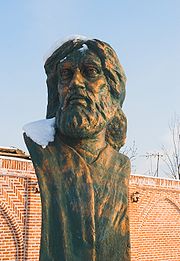Introduction: Shams-e-Tabrizi (d.1248) was an Iranian Sufi mystic born in the city of Tabriz in Iranian Azerbaijan. He introduced Mawlana Jalal ad-Din Muhammad Balkhi, usually known as Rumi in the West, to Islamic mysticism, for which he was immortalized in Rumi’s poetry collection Diwan-e Shams-e Tabriz-i (“The Works of Shams of Tabriz”). Shams lived together with Rumi in Konya, in present-day Turkey, for several years, and is also known to have traveled to Damascus in present-day Syria.
According to a verbal tradition, once while Rumi was reading next to a large stack of some books, Shams Tabriz, passing by, asked Rumi, “What are you doing?” Rumi scoffingly replied, “Something you cannot understand.” On hearing this, Shams threw the stack of books into a nearby pool of water. Rumi hastily took the books out of the water, but to his surprise they were all dry. Rumi then asked Shams, “What is this?” To which Shams replied, “Mowlana, this is what you cannot understand.”
After several years with Rumi, Shams left him suddenly and traveled to Khoy and settled there. Shams Tabrizi died in Khoy and is buried there. Source: Wikipedia.
Sculpture depicting Shams Tabriz near his grave in Khoy
Parable:
I have been a misunderstood since childhood.
I knew that no one understood me, not even my father.
He once said:
“You are not a madman fit to be put in a madhouse, nor are you a monk to be put in a monastery. I just don’t know what you are!”
I replied:
“You know, father, I can tell you what it is like. Once a duck egg was put under a hen to be hatched. When the egg hatched, the duckling walked along with the mother hen until they came to a pond. The duckling took a nice dip in the water. But the hen stayed on the bank and clucked.
Now, my dear father, after having tried the sea I find it my home. If you choose to stay on the shore, is it my fault? I am not to be blamed.”
_________________
For more parables/stories, please click PARABLES AND STORIES.


Brilliant. Thank you for sharing.
This parable has been written in detail in Noor-e-Mubeen by Chunara published in Mumbai during the time of Imam Sultan Muhammad Shah. Few of the question and answers are written in Persian and are a good source for understanding the Zaheer and Batin.
Just Brilliant.